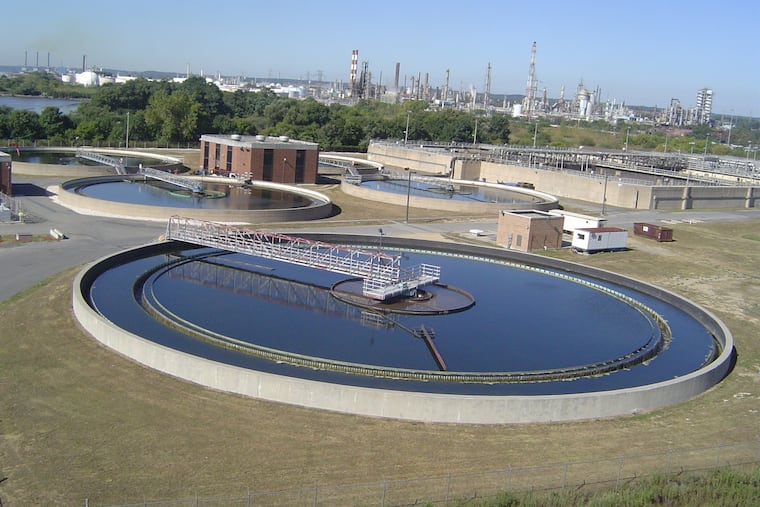Judges panel recommends that Pa. nix $276 million sale of Delco sewer system to Aqua
The recommendation to reject the sewer system privatization is likely to carry much weight with the Pennsylvania Public Utility Commission.

A panel of administrative law judges has recommended that Pennsylvania reject the proposed $276 million sale of Delaware County’s sewer system to Aqua Pennsylvania, saying too many unresolved issues entangle the proposal, which would be Pennsylvania’s largest privatization ever of a public water or wastewater system.
The recommendation by two hearing examiners to reject the proposed sale of the Delaware County Regional Water Quality Control Authority (DELCORA) is likely to carry much weight with the Pennsylvania Public Utility Commission, which must approve or reject the sale by March 26. But the PUC is not obligated to follow the recommendation.
The sale of the sprawling sewer system, which serves 165,000 customers in 42 towns in Delaware and Chester Counties, was engineered in late 2019 in the final months before Republicans lost control of Delaware County after more than a century of power. A new Democratic majority of county council last year moved to undo the decision, calling it a tactic to protect patronage jobs.
The recommended decision comes about two weeks after Delaware County Common Pleas Court Judge Barry C. Dozor on Dec. 28 rejected the county’s legal attempt to block the sale, saying the agreement was “fully binding and enforceable.” The county is likely to appeal that decision later this month.
The administrative law judges cited that unsettled legal battle, but also examined the sale from the prism of public utility law. In a 29-page decision posted with the PUC on Tuesday, Administrative Law Judges Angela T. Jones and F. Joseph Brady said Aqua failed to meet its burden of proof that the sale was in the public interest.
They said that Aqua should have included in its application the novel rate-stabilization plan in which money from the sale would be used to hold down rate increases for DELCORA customers for the first seven years. DELCORA said that after it paid off $66 million in debt and expenses, it would bank the remaining $210 million to limit yearly bill increases to under 3% for those years.
However, Delaware County argued that after the money ran out, customers would see rates skyrocket 70%.
“Between the ongoing litigation and lack of a rate stabilization plan attachment,” wrote the judges, based in the PUC’s Philadelphia office, “there are simply too many outstanding issues that need to be resolved in order for the commission to be able to analyze this application and make an informed recommendation.”
Aqua Pennsylvania, which is owned by Essential Utilities of Bryn Mawr, said it would file objections to the decision.
“We remain confident that a combination with DELCORA is the best outcome for customers and are optimistic that the PUC will realize the merits of the transaction, particularly the benefits to customers,” Aqua Pennsylvania president Marc Lucca said in a statement Wednesday. “We continue to look forward to serving DELCORA customers once the transaction is approved.”
DELCORA said it was disappointed by the recommended decision, but “will work to clear the concerns raised by the recommendation” before the PUC makes a final decision, the agency said in a statement.
Delaware County Council Chairman Brian Zidek, a Democrat, on Wednesday hailed the recommendation against a sale.
“We’re just trying to pursue positions that we think best serve the citizens of Delaware County, and we think anything that can impede this bad deal from occurring is a positive thing,” he said.
Pennsylvania’s Office of Consumer Advocate, Office of Small Business Advocate, and the PUC’s Bureau of Investigation and Enforcement also objected to the Aqua sale, as did several towns and several large customers, including Energy Transfer LP, which operates the Marcus Hook Industrial Complex, and Kimberly-Clark Corp., which owns a toilet paper plant in Chester that it says is DELCORA’s largest customer.